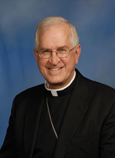June 25, 2013

Last month I joined with priests of the archdiocese to celebrate a wonderful Jubilee Mass, followed by an enjoyable meal. Among the great traditions in Louisville, this Jubilee Mass that occurs each year so close to the Kentucky Derby ranks ahead of the race for me, though I do very much enjoy the Derby.
The celebration has an elegant simplicity. First we gather for Mass, always a good turnout to honor our priests. This year we honored four silver jubilarians, two with golden anniversaries and one priest who celebrated 60 years of priestly service.
Usually one of the jubilarians preaches, and this year, Father Scott Wimsett did a great job. Then we retire to the undercroft of the Cathedral of the Assumption for a social time and dinner. At the end of the meal, a priest — either the jubilarian or someone he invites — speaks for five minutes or so. While the tone of the presentations is very lighthearted and often downright funny, beneath the surface is revealed the great love of a priestly brother and a deep respect and love for the priesthood of Jesus Christ.
Of course, every baptized person shares in the priestly dignity of Jesus. Those marked by Holy Orders, however, have a special relationship of service with the bishop. To quote the homily from the ordination rite, they are “… established co-workers of the Order of Bishops, with whom they are joined in the priestly office and with whom they are called to the service of the people of God.”
This year as we welcome three newly ordained priests and two priests who are Carmelites of Mary Immaculate (CMI) from India, we also honor a hardworking group — “retired priests,” who labor sometimes as hard as they did before retirement. Are we ever blessed!
“Retirement” is a funny word to use in association with a priest, because canonically one does not retire from being a priest. Dioceses, however, set a time when a priest resigns from his office, which often involves care of a parish as a pastor, but many “retired priests” generously continue to serve as their health and circumstances allow. These fine priests who labor into retirement for years recall Psalm 110, often sung at the ordination of a priest while his hands are being anointed and he is vested in stole and chasuble — words echoed also in the Letter to the Hebrews 7:21 in which Jesus is exalted as “…a priest forever, according to the order of Melchizedek.”
The story of every priest is precious and worth telling. One man — 60 years a priest — is both exceptional and typical. Serving at St. Michael Church since 1997 after his formal “retirement,” Father Kenny Kamber is well known for his kind and gracious pastoral sense and presence.
He also is very involved in the community. Recently, he was honored by Kentucky Right to Life for his untiring, courageous and compassionate concern for children in the womb as well as their parents and families.
After the Jubilee Mass, I tweeted his photo and got more re-tweets than you can imagine. It is a joy for me to highlight and give praise to God for the gift of Father Kenny Kamber. From every corner of the Archdiocese, he is deeply admired and appreciated. While he is exceptional, he also is quite typical of the priests who labor day in and day out in service of the faithful.
Earlier this month at the Presbyteral Assembly at Saint Meinrad, Father Ron Knott referred to the universal call to holiness that is center stage in the documents of the Second Vatican Council. In a particular way, Chapter five of the Dogmatic Constitution on the Church, known as Lumen Gentium (from the first two words of the document that refer to Jesus Christ as the light to all nations), outlines the unique path laid out for priests in their road to holiness. Number 41 says: “they (priests) should grow in the love of God and of their neighbor by the daily exercise of their duty, should keep the bond of priestly fellowship, should abound in every spiritual good and bear a living witness of God to all, imitating those priests who, in the course of centuries, left behind them an outstanding example of holiness, often in a humble and hidden service.”
St. Augustine combated the tenets of an early church heresy known as Donatism, which falsely claimed that the power of a sacrament depended on the particular holiness of the minister and not on the lavish grace of God. In doing so, he acknowledged the weakness of bishops and priests and called them to deep holiness — so that the sacraments would draw them more closely to Christ as they serve as channels of His grace.
Acknowledging the frailty of us all, at the same time I thank God for the blessings of our priests. We have been blessed in abundance. How good to have Jubilee celebrations to remind us of our blessings!


